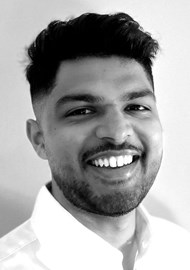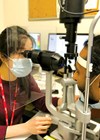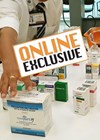The elective period for medical students is a unique opportunity to immerse oneself in a field of interest. For students interested in ophthalmology, this can offer a dedicated experience for what can otherwise be quite limited through undergraduate rotations. Alongside very useful clinical exposure, there is also the opportunity to curate a bespoke experience that appeals to one’s individual interests. I was fortunate enough to have managed just this (albeit with a lot of planning) through an international experience in Cape Town, South Africa and a research experience at Moorfields Eye Hospital. In this article, I will be outlining my motivation for organising my elective in this way, the experience itself and most importantly, guiding you through doing something similar!
Background
The aim of my elective was to cement my growing interest in ophthalmology, however I also wanted to explore other facets of healthcare that piqued my interest – namely, healthcare in an international setting and research in innovation. In light of constraints posed by post-pandemic travel (and as per my medical school’s advice!), I strategically divided my elective between locations in the UK and overseas.
The first half was spent at Groote Schuur Hospital in Cape Town, offering a unique perspective on ophthalmic practices in a different healthcare setting. Subsequently, the latter part of my elective comprised a research-focused endeavour conducted at the Moorfields Eye Hospital Ophthalmic Reading Centre and Clinical AI (artificial intelligence) Lab.
International elective: Groote Schuur Hospital, Cape Town
During my elective at Groote Schuur, I gained a thorough insight into clinical ophthalmology as well as an appreciation for healthcare within a different system and managing a different disease burden.
My experience
I spent time in various medical settings, including specialist clinics, theatres, eye casualty, and teaching sessions. Patients accessing public services often came from deprived backgrounds across the Western Cape, and some travelled from other African countries seeking specialised care. I observed patients with advanced diseases, notably one patient with extreme thyroid eye disease requiring decompressive surgery. Resource constraints were evident, even in basic investigations such as ordering blood tests. In reflection, it made me appreciate the hidden costs of everyday procedures and investigations within the NHS and similarly the amazing accessibility to services we are privileged to offer in the UK. The entire experience highlighted the significant and rewarding work of delivering care in these settings.
In clinics, I initially observed consultations before later independently clerking new patients. The team was very supportive in discussing slit-lamp examinations, ophthalmic histories, and provisional management plans. Theatres provided insights into microsurgery intricacies, and surgeons were eager to teach during procedures. Eye casualty, a busy service, presented a variety of pathologies, including acute infections, first presentation tumours, and traumatic injuries. I also participated in retinopathy of prematurity screening at the local women's hospital and attended paediatric ophthalmology clinics at Red Cross Hospital, Cape Town. Teaching sessions, both for medical students and specialty registrars, added to the enriching and supportive experience. Overall, I would highly recommend this elective for anyone interested.
Tips for an elective in South Africa
- Plan early. I would recommend registering your interest well in advance (12+ months) of your elective dates, and formally consider applying around a year beforehand.
- Talk to the universities and / or hospitals. My elective was organised through the University of Cape Town, but I found reaching out to a senior clinician at the hospital really helped to streamline the process.
- Apply for funding to ease the financial costs – see below!
Research elective: Moorfields Eye Hospital’s Reading Centre and Clinical AI Lab
My involvement with the clinical AI team at Moorfields was a great insight into the workings of modern-day research practices and the pipeline of innovation.
Why a research elective?
Research underpins everything in modern medicine and is a means to improving patient care. Owing to some of the unique properties of the eye, ophthalmology is a pioneer in multiple areas of research including AI and genetics – and one of the main reasons for my interest in ophthalmology. More generally, producing and navigating research is an increasingly important skill for doctors, which is reflected in many applications including ophthalmology. The elective period is an opportunity to spend a dedicated timeframe in this area, without the same pressures of exams and clinical duties.
My experience
Given the immense scale and length of projects that the AI clinical hub undertakes, the research elective acted as an initial introduction to this area with the hopes of a longer lasting contribution. I was able to organise this placement by simply reaching out to the team through their email that I found online. This was later followed by sending over my CV with prior experiences and a couple of phone calls about my motivations and aims. Over a period of a several weeks, I got to observe the workings across multiple streams of ophthalmic innovation managed at the centre, including artificial intelligence, digital eye health and telemedicine.
My experience included being a part of multi-disciplinary meetings that were made up of clinicians, dedicated researchers, and software engineers. I was able to observe the thought processes involved in trial design, the different stages of analysis and the importance of presenting findings coherently. It was particularly interesting to observe the distinctive perspectives and skills of different team members. I simultaneously built up a knowledge base in AI systems, an appreciation for the underlying technology, and different ophthalmic imaging modalities. More practically, my contribution came in aiding with literature searching and compilation, which was something I had experienced with prior projects. I found that for large periods I was required to work independently, which was sometimes difficult to manage but provided an opportunity to take time and read up on new concepts.
Programming is the fundamental tool for many of these applications, and being able to build upon my existing skills with the help of engineers was extremely useful. The heavy and detailed programming tends to be the remit of the software engineers, however alongside a genuine interest, I hope such skills will help facilitate future endeavours and an understanding of the emerging tools within ophthalmology. Skill procurement can be difficult to balance alongside usual clinical commitments, with the elective period a particularly good opportunity for those also wanting to gain wet-lab experience.
This was overall a formative and rewarding experience that I hope will influence my career pursuits and lead to meaningful and innovative outcomes. In general, several weeks is not enough to complete research cycles and instead should be used as an introductory period to assimilate to a new surrounding or research area and exploration of interests. Research experiences will vary dependent on the type of research and the team dynamics, however, to achieve meaningful returns a proactive attitude and long-term dedication is necessary!
Tips for a research elective
- Reach out to prospective supervisors. Often university email addresses are freely available online, or it may be possible to reach out via secretaries.
- Schedule an early meeting. This is important to set out expectations and to discuss reasonable aims.
- Start preparatory reading beforehand. This allows you to spend your actual elective time getting stuck into your research matter.
Conducting research as a medical student
As previously mentioned, research is an important and fascinating area of medicine, with the elective not being the only opportunity to be involved in research during medical school.
You will find that there are formalised pathways to explore research. These include curriculum-based projects such as review articles, which may have scope to convert into formal research. Otherwise, many universities offer a year to conduct research through an integrated bachelor’s or master’s degree, which may be compulsory or optional as part of your university course. These years include a formal education across multiple research concepts but also dedicated time to work on a project.
“Research underpins everything in modern medicine and is a means to improving patient care”
The other routes are more informal – these are typically sourced through reaching out and speaking to different research groups and supervisors. This is particularly useful as a chance to explore the exact areas that interest you. You may find that while you are in the earlier years it is difficult to get the ball rolling, but with enough perseverance you should find a supervisor with the right project for you. Speaking to faculty members or tutors can be often helpful to aid with these introductions. Alternatively, speaking to consultants during hospital placements can prove helpful. The projects that initially would be more suitable tend to be longitudinal projects that you can contribute to alongside medical school. For certain projects such as lab-based projects however, it may require sacrificing some of your holidays. If this is the case, many universities or external bodies provide funding opportunities that you can apply for with your supervisor.
From my experience with research as medical student, it is important to be proactive, actively seek opportunities and reach out to multiple teams and professors. Often things can start slow and be unfruitful, but once you find the right fit, great opportunities can flourish.

Funding your elective
The elective is definitely an amazing chance to experience new settings, such as an attachment abroad. However, this can potentially come at some financial cost when considering tuition fees, flights and accommodation. Fortunately, there are some very useful sources that can help support your journey.
In general, funding sources are typically applied for prospectively (i.e. before your elective) and may be means-tested although many are universally available. I was fortunate to receive support from my medical school, through the St Mary’s Development Trust at Imperial College London. Many universities will offer similar funding, but it may not necessarily be widely advertised. It is definitely worth reaching out to your elective office in a timely manner, to prevent missing any deadlines. Other sources may be specialty specific. I was very grateful to receive the Patrick Trevor-Roper award from the Royal College of Ophthalmologists, which is offered each year. The application itself is very straightforward and asks you to explain your planned elective and motivations with an expectation that you will submit a report upon completion. The Royal College updates their website with copies of the reports from previous years to showcase where previous students have travelled and what they have experienced.
Other sources are available from the Wellcome Trust, Royal College of Physicians and the Royal Society of Medicine to name a few! Each will provide support to specific electives, such as abroad experiences or research-based projects, so it is important to do your research. With regards to applying, each body will have their own specification and stipend, but typically will want to see that you have a well-defined and purposeful elective planned and may require a supporting letter from your supervisor. It is also worth noting the NHS bursaries can help cover accommodation and internal travel costs (to a certain amount!).
Summary
In conclusion, my elective experience proved highly gratifying and motivational. The comprehensive exposure to different countries, disease burdens, and healthcare systems was eye-opening and inherently inspiring. The elective is a great opportunity to explore and combine interests as you wish. The key to achieving this however is doing your own planning and research beforehand and reaching out to teams and departments well in advance, particularly with regards to potential funding or abroad applications.
Equally, I would like to acknowledge the generous support I received from Dr Van der Lecq and the team at Groote Schuur Ophthalmology department, and Dr Konstantinos Balaskas and the Reading Centre faculty.
Declaration of competing interests: None declared.
COMMENTS ARE WELCOME











